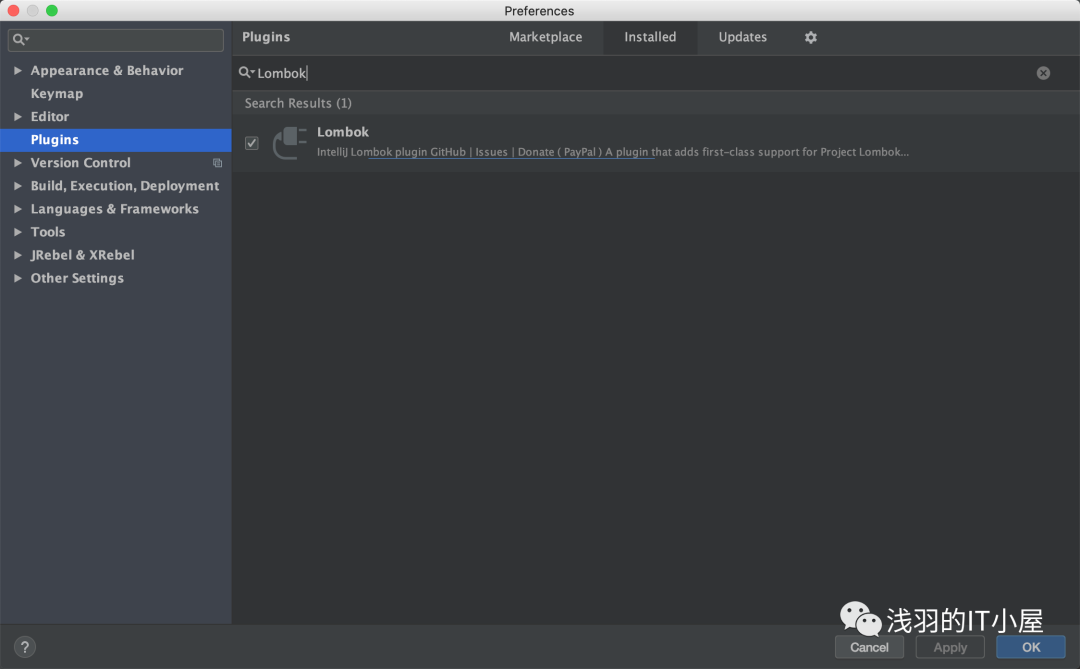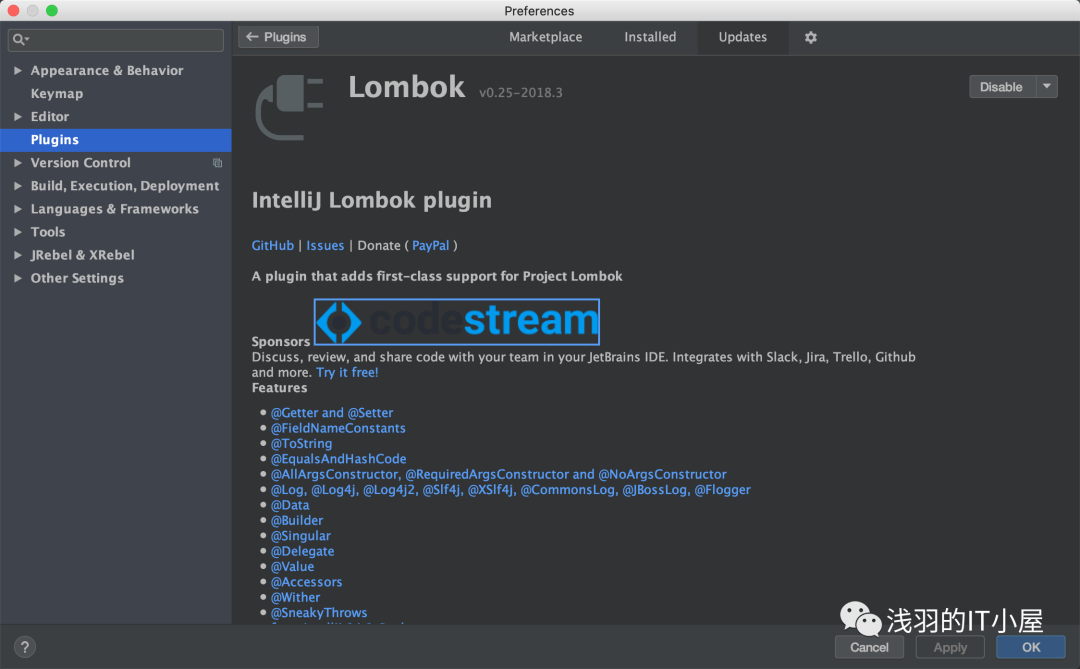簡化開發|Lombok神器帶你消除冗余代碼
前言
Lombok是一款Java開發插件,使得Java開發者可以通過其定義的一些注解來消除業務過程中冗余的代碼,尤其是簡單的Java模型對象(POJO)。而當我們如果在開發環境中使用Lombok開發插件后,可以省出重復構建,諸如hashCode和equals這樣的方法以及各種業務對象模型的accessor和ToString等方法的大量時間。對于這些方法,它能夠在編譯源代碼期間自動幫我們生產這些方法,并沒有如反射那樣降低程序的性能。本文將帶大家詳細介紹關于Lombok的使用以及原理。
1. Lombok的概念
「概念:」
Lombok是一種Java實用工具,可以用來幫助開發人員消除冗余的代碼,對于一些簡單的Java對象(POJO),它通過注釋實現這一目的。
2、Lombok的安裝
「安裝步驟:」
在IDEA的插件Plugins中搜索Lombok
安裝Lombok
「注意:」
在使用Lombok注解的時候記得要導入Lombok.jar包到工程,Maven Project的話,要在pom.xml中添加依賴
- <dependency>
- <groupId>org.projectlombok</groupId>
- <artifactId>lombok</artifactId>
- <version>1.16.8</version>
- </dependency>
3、Lombok注解說明
「常用注解:」
- Lombok注解說明
- * val:用在局部變量前面,相當于將變量聲明為final
- * @NonNull:給方法參數增加這個注解會自動在方法內對該參數進行是否為空的校驗,如果為空,則拋出NPE(NullPointerException)
- * @Cleanup:自動管理資源,用在局部變量之前,在當前變量范圍內即將執行完畢退出之前會自動清理資源,自動生成try-finally這樣的代碼來關閉流
- * @Getter/@Setter:用在屬性上,再也不用自己手寫setter和getter方法了,還可以指定訪問范圍
- * @ToString:用在類上,可以自動覆寫toString方法,當然還可以加其他參數,例如@ToString(exclude=”id”)排除id屬性,或者@ToString(callSuper=true, includeFieldNames=true)調用父類的toString方法,包含所有屬性
- * @EqualsAndHashCode:用在類上,自動生成equals方法和hashCode方法
- * @NoArgsConstructor, @RequiredArgsConstructor and @AllArgsConstructor:用在類上,自動生成無參構造和使用所有參數的構造函數以及把所有@NonNull屬性作為參數的構造函數,如果指定staticName = “of”參數,同時還會生成一個返回類對象的靜態工廠方法,比使用構造函數方便很多
- * @Data:注解在類上,相當于同時使用了@ToString、@EqualsAndHashCode、@Getter、@Setter和@RequiredArgsConstrutor這些注解,對于POJO類十分有用
- * @Value:用在類上,是@Data的不可變形式,相當于為屬性添加final聲明,只提供getter方法,而不提供setter方法
- * @Builder:用在類、構造器、方法上,為你提供復雜的builder APIs,讓你可以像如下方式一樣調用Person.builder().name("Adam Savage").city("San Francisco").job("Mythbusters").job("Unchained Reaction").build();更多說明參考Builder
- * @SneakyThrows:自動拋受檢異常,而無需顯式在方法上使用throws語句
- * @Synchronized:用在方法上,將方法聲明為同步的,并自動加鎖,而鎖對象是一個私有的屬性$lock或$LOCK,而java中的synchronized關鍵字鎖對象是this,鎖在this或者自己的類對象上存在副作用,就是你不能阻止非受控代碼去鎖this或者類對象,這可能會導致競爭條件或者其它線程錯誤
- * @Getter(lazy=true):可以替代經典的Double Check Lock樣板代碼
- * @Log:根據不同的注解生成不同類型的log對象,但是實例名稱都是log,有六種可選實現類
- * @CommonsLog Creates log = org.apache.commons.logging.LogFactory.getLog(LogExample.class);
- * @Log Creates log = java.util.logging.Logger.getLogger(LogExample.class.getName());
- * @Log4j Creates log = org.apache.log4j.Logger.getLogger(LogExample.class);
- * @Log4j2 Creates log = org.apache.logging.log4j.LogManager.getLogger(LogExample.class);
- * @Slf4j Creates log = org.slf4j.LoggerFactory.getLogger(LogExample.class);
- * @XSlf4j Creates log = org.slf4j.ext.XLoggerFactory.getXLogger(LogExample.class);
4、Lombok代碼示范
「代碼示例:」
val將變量聲明final類型
- public static void main(String[] args) {
- val sets = new HashSet<String>();
- val lists = new ArrayList<String>();
- val maps = new HashMap<String, String>();
- //=>相當于如下
- final Set<String> sets2 = new HashSet<>();
- final List<String> lists2 = new ArrayList<>();
- final Map<String, String> maps2 = new HashMap<>();
- }
@Nonnull為方法和構造函數的參數提供非空檢查
- public void notNullExample(@NonNull String string) {
- string.length();
- }
- //=>相當于
- public void notNullExample(String string) {
- if (string != null) {
- string.length();
- } else {
- throw new NullPointerException("null");
- }
- }
@Cleanup自動釋放資源
- public static void main(String[] args) {
- try {
- @Cleanup InputStream inputStream = new FileInputStream(args[0]);
- } catch (FileNotFoundException e) {
- e.printStackTrace();
- }
- //=>相當于
- InputStream inputStream = null;
- try {
- inputStream = new FileInputStream(args[0]);
- } catch (FileNotFoundException e) {
- e.printStackTrace();
- } finally {
- if (inputStream != null) {
- try {
- inputStream.close();
- } catch (IOException e) {
- e.printStackTrace();
- }
- }
- }
- }
@Getter/@Setter對類的屬性字段自動生成Get/Set方法
- @Setter(AccessLevel.PUBLIC)
- @Getter(AccessLevel.PROTECTED)
- private int id;
- private String shap;
@ToString為類生成一個toString方法
- @ToString(exclude = "id", callSuper = true, includeFieldNames = true)
- public class LombokDemo {
- private int id;
- private String name;
- private int age;
- public static void main(String[] args) {
- //輸出LombokDemo(super=LombokDemo@48524010, name=null, age=0)
- System.out.println(new LombokDemo());
- }
- }
@EqualsAndHashCode為類生成equals和hasCode方法
- @EqualsAndHashCode(exclude = {"id", "shape"}, callSuper = false)
- public class LombokDemo {
- private int id;
- private String shap;
- }
@NoArgsConstructor,@RequiredArgsConstructor and
@AllArgsConstructor,分別為類自動生成無參構造,指定參數構造器和包含所有參數構造器
- @NoArgsConstructor
- @RequiredArgsConstructor(staticName = "of")
- @AllArgsConstructor
- public class LombokDemo {
- @NonNull
- private int id;
- @NonNull
- private String shap;
- private int age;
- public static void main(String[] args) {
- new LombokDemo(1, "circle");
- //使用靜態工廠方法
- LombokDemo.of(2, "circle");
- //無參構造
- new LombokDemo();
- //包含所有參數
- new LombokDemo(1, "circle", 2);
- }
- }
@Data在類上使用,相當于同時使用@ToString、
@EqualsAndHashCode、@Getter、@Setter和
@RequiredArgsConstructor這些注解
- import lombok.Data;
- @Data
- public class Menu {
- private String shopId;
- private String skuMenuId;
- private String skuName;
- private String normalizeSkuName;
- private String dishMenuId;
- private String dishName;
- private String dishNum;
- //默認閾值
- private float thresHold = 0;
- //新閾值
- private float newThresHold = 0;
- //總得分
- private float totalScore = 0;
- }
@Value為屬性添加final聲明
- @Value
- public class LombokDemo {
- @NonNull
- private int id;
- @NonNull
- private String shap;
- private int age;
- //相當于
- private final int id;
- public int getId() {
- return this.id;
- }
- ...
- }
@Builder提供構建值對象方式
- @Builder
- public class BuilderExample {
- private String name;
- private int age;
- @Singular
- private Set<String> occupations;
- public static void main(String[] args) {
- BuilderExample test = BuilderExample.builder().age(11).name("test").build();
- }
- }
@SneakyThrows自動拋受檢異常
- import lombok.SneakyThrows;
- import java.io.FileInputStream;
- import java.io.FileNotFoundException;
- import java.io.InputStream;
- import java.io.UnsupportedEncodingException;
- public class Test {
- @SneakyThrows()
- public void read() {
- InputStream inputStream = new FileInputStream("");
- }
- @SneakyThrows
- public void write() {
- throw new UnsupportedEncodingException();
- }
- //相當于
- public void read() throws FileNotFoundException {
- InputStream inputStream = new FileInputStream("");
- }
- public void write() throws UnsupportedEncodingException {
- throw new UnsupportedEncodingException();
- }
- }
@Synchronized將方法聲明同步并自動加鎖
- public class SynchronizedDemo {
- @Synchronized
- public static void hello() {
- System.out.println("world");
- }
- //相當于
- private static final Object $LOCK = new Object[0];
- public static void hello() {
- synchronized ($LOCK) {
- System.out.println("world");
- }
- }
- }
@Getter(lazy=true)可以替代經典的Double check Lock樣板代碼
- public class GetterLazyExample {
- @Getter(lazy = true)
- private final double[] cached = expensive();
- private double[] expensive() {
- double[] result = new double[1000000];
- for (int i = 0; i < result.length; i++) {
- result[i] = Math.asin(i);
- }
- return result;
- }
- }
- // 相當于如下所示:
- import java.util.concurrent.atomic.AtomicReference;
- public class GetterLazyExample {
- private final AtomicReference<java.lang.Object> cached = new AtomicReference<>();
- public double[] getCached() {
- java.lang.Object value = this.cached.get();
- if (value == null) {
- synchronized (this.cached) {
- value = this.cached.get();
- if (value == null) {
- final double[] actualValue = expensive();
- value = actualValue == null ? this.cached : actualValue;
- this.cached.set(value);
- }
- }
- }
- return (double[]) (value == this.cached ? null : value);
- }
- private double[] expensive() {
- double[] result = new double[1000000];
- for (int i = 0; i < result.length; i++) {
- result[i] = Math.asin(i);
- }
- return result;
- }
- }
@Log根據不同的注解生成不同類型的log對象
- * @CommonsLog Creates log = org.apache.commons.logging.LogFactory.getLog(LogExample.class);
- * @Log Creates log = java.util.logging.Logger.getLogger(LogExample.class.getName());
- * @Log4j Creates log = org.apache.log4j.Logger.getLogger(LogExample.class);
- * @Log4j2 Creates log = org.apache.logging.log4j.LogManager.getLogger(LogExample.class);
- * @Slf4j Creates log = org.slf4j.LoggerFactory.getLogger(LogExample.class);
- * @XSlf4j Creates log = org.slf4j.ext.XLoggerFactory.getXLogger(LogExample.class);
結語
本篇關于Lombok的介紹就先到這里結束了,后續會出更多關于Lombok系列更多文章,謝謝大家支持!


































